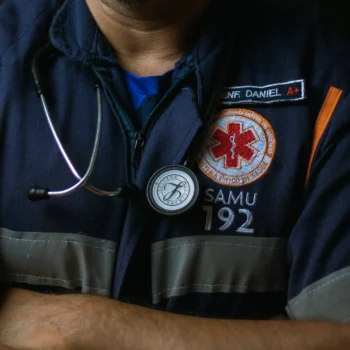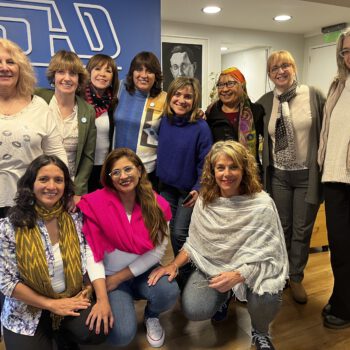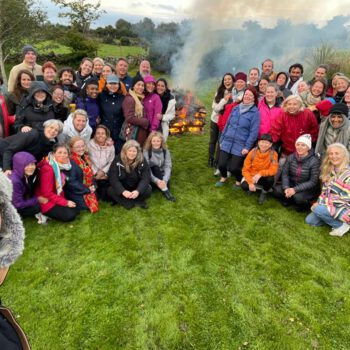A Somatic Relational Psychedelic Therapist and Somatic Transformation Educator, Rita is the director of Brilliant Healing Inc. She works with individuals and groups, leads unique, experiential, creative healing retreats, trains, mentors and supervises international students in her Somatic Relational Trauma-informed Practices for Medicine-Assisted Facilitation program. She’s also an author, podcast co-host, a multidisciplinary creator, playwright, retired professional actor and dancer. (max 60 words)
This short edited excerpt of Rita’s interview touches on her history with CPTSD, her psychedelic work and the play she wrote and starred in, with Gabor Maté. Hear her full interview on The Gifts of Trauma.

It’s easy to lose our laughter. Especially in these times we live in. But when we have it, when we can let it rip, the whole body starts to bubble up, the organs loosen, the blood flows, our eyes sparkle and we make wonderfully bizarre sounds… It’s a beautiful way for people to bond, and it’s so, so necessary.
Traumatized cultures often have the best jokes, just as traumatized people can exhibit wry humor. We all get to the point when we just have to laugh. As a Hungarian, I grew up in such a culture, which has a unique humor that calls out the evils of society, of communism and authoritarian regimes, in clever ways.
As my mother lived through the Soviet occupation’s reign of terror in Hungary, there was a heaviness or a darkness in the family. Later in Canada, when darkness descended in our familial world, I’d suddenly hear a little cackle. My mother was laughing to herself! Her cackle would lead to contagion. I didn’t know why she was laughing, but it would catch. I lived for those moments of deliverance and liberation.
During a psychedelic journey I discovered that I absorbed my mother’s terror as I came through the birth canal. By the time I was 5, 6 or 7 years old, I was always scared, always wondering when my family would erupt again. I became increasingly afraid of other people. Not understanding social cues or the Canadian culture I lived in led me to believe I was in some way deficient, or behind.
As a child of refugees, I experienced the devastation the past enacted in my family. I had to grow up when I wasn’t yet bio psychologically developed. Being task oriented filled the gap, as I could work out what to do to make a difference. Whether it was to clean up an emotional mess or a physical mess, I did it all.
I knew I was smart but I struggled, as I didn’t know dissociation as either a word or a concept. As I tried to take in information and make sense of my surroundings, I felt the incoming fog. In truth, I was in excruciating emotional pain, which drove me to discover defensive coping strategies. I learned how to be a good student even though I couldn’t take in half of what I heard because I was distracted by thinking about what had just happened at home. I figured out how to be my parents’ perfect child, even while I was raging inside, feeling the pressure to repair the family, which was what they wanted from me. But when I did explode, I was shamed. It’s so complex, so complicated. I’m surprised I didn’t fragment into a thousand pieces.
By the time I was 13, I needed to find a way to get out of the house. I auditioned for the National Ballet School and was devastated when I wasn’t accepted. But I was determined, and being really smart, I knew that to stay on this planet, I had to get out of my parent’s house. After a lot of hard work, I reauditioned, got in, and promptly redirected all of my pain toward my passion for dance. It’s a physically and emotionally painful and complex existence, rife with competition, comparison, pressure and the difficult realities of the dance world. When the music was playing and I was dancing, I felt hope. But when the music stopped there was starvation. For many years I was anorexic and bulimic. I also experienced constant despair and utter rejection.
Those are my beginnings. My foundations vacillated from fear and desperation to the adaptations born from fear and desperation. Yes, there were moments of fun, but so much hard work, so much isolation and sadness.
Developmental trauma is a massive subject. I teach it, I research it and I learn about it within myself. Rooted in ancestral, transgenerational, multi-generational and intergenerational trauma, developmental trauma comes through the relationships we’re born into, relationships that [ironically] directly affect our development.
In developmental trauma our environment fails to provide attunement, and/or connection, and/or interest, and/or engagement and/or co-regulation and/or empathy, at the most critical stages of our brain development. The lack of that nurturance leaves gaps in our neural connectivity. Even highly functioning people can have these disconnects in their right hemispheric sense of self, which result in them being both really smart in some ways and really undeveloped in other ways. But while trauma distorts and exaggerates our essence, accommodations and adaptations help us survive. Even if we have despair, accommodations give us something to do. We tend to do a lot of whatever that is, as it gives us hope. But it also wears us down.
My adaptations led me to work more than I’ve ever worked in my life—exactly what I was trying not to do. But they also enabled me to meet a vast number of extraordinary people. So they’re both a gift and a burden. It’s a very fine line between the adaptations and the wounds that run them. I used to wonder… Did I do this all from trauma? Is there any sanity in what I’m doing now? Is there an explanation for why I do as much as I do, other than complex trauma and developmental trauma?
Having experienced complex post traumatic stress, in addition to heavy ancestral trauma, I have my own very dark passages. I’m also highly creative, and I’ve learned that if I don’t allow my creativity to flow, I can become very depressed. When the darkness comes, I use a conscious practice of seeking out ‘glimmers of hope’, recollections of when I felt light, when my body moved with ease. It’s a relatively new practice and it’s not easy. When my body has been under chronic stress for too long, I can end up deep in the dark caves of my soul. And it’s not easy to find glimmers of hope in those deep, dark caves. But I’ve always had energy, enthusiasm, passion and conviction… this surge of life, or ‘vitality effect,’ that comes through me, I can feel almost dead, and then this surge rises. My mother and I joke about it. She’s 94 years old, 4 foot 9, and considers herself, “Small and strong like a peppercorn.” I inherited my passion and energy from her.
The Gifts of Trauma is a weekly podcast that features personal stories of trauma, transformation, healing, and the gifts revealed on the path to authenticity. Listen to the interview, and if you like it, please subscribe, leave a rating or review, and share it with others in your community.



